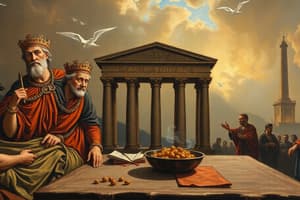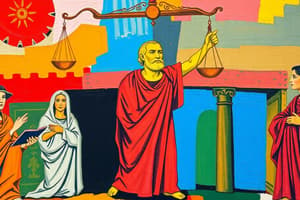Podcast
Questions and Answers
What does Socrates identify as a major flaw in democracy?
What does Socrates identify as a major flaw in democracy?
- It allows for too many leaders with the proper skills.
- It enables selfish individuals to seize power. (correct)
- It discourages philosophical thought in governance.
- It focuses too heavily on military strength.
In Plato's ideal political state, who are considered the rulers?
In Plato's ideal political state, who are considered the rulers?
- Demagogues elected by the masses.
- Producers responsible for work and trade.
- Philosopher-kings or guardians. (correct)
- Soldiers who protect society.
What analogy does Socrates use to illustrate his criticism of democracy?
What analogy does Socrates use to illustrate his criticism of democracy?
- A ship controlled by incompetent sailors. (correct)
- A marketplace filled with dishonest merchants.
- A kingdom ruled by a single corrupt monarch.
- A garden tended by careless gardeners.
According to Socrates, what type of leaders typically emerge in a democracy?
According to Socrates, what type of leaders typically emerge in a democracy?
What does Socrates believe excessive freedom in democracy leads to?
What does Socrates believe excessive freedom in democracy leads to?
Flashcards are hidden until you start studying
Study Notes
Socratic Critique of Democracy
- Socrates critiques democracy for promoting excessive freedom, which can lead to chaos and a lack of responsibility among citizens.
- He argues that in a system allowing all to rule, selfish individuals can rise to power, undermining the common good.
- Socrates warns that democracy can pave the way for dictators, tyrants, and demagogues, as unsuitable leaders gain influence.
- He highlights that democratic leaders often lack the necessary skills or moral integrity, decreasing the likelihood of competent governance.
Ideal Political Structure
- Plato proposes a hierarchical political system consisting of three distinct classes:
- Philosopher-Kings (Guardians): The ruling class making decisions for the society based on wisdom and knowledge.
- Auxiliaries (Soldiers): The protective class responsible for defense and enforcement of the rulers' decisions.
- Producers: The working class engaged in creating goods and providing services essential for the society's economy.
Ship of State Analogy
- Socrates uses the "Ship of State" analogy to illustrate the problems of democracy:
- A ship owner, who is physically strong but lacks knowledge of navigation, represents the average citizen.
- Sailors, untrained in navigation, debate over who should steer the ship without understanding the craft, reflecting democratic decision-making chaos.
- The persuasive sailor who convinces the owner to let him steer symbolizes the philosopher-king, emphasizing the need for knowledgeable rulers.
Philosophical Foundations
- The concept of a republic in Plato's Republic differs from modern interpretations and emphasizes philosophical governance rather than democratic principles.
- Plato's vision advocates for rule by the knowledgeable elite, asserting that only those with the right understanding should lead society.
Studying That Suits You
Use AI to generate personalized quizzes and flashcards to suit your learning preferences.




